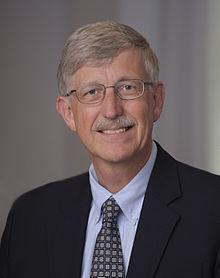
Biography of Francis S. Collins
born April 14, 1950, Staunton, Virginia, U.S.A.
|
|
Biography of Francis S. Collinsborn April 14, 1950, Staunton, Virginia, U.S.A. |
Francis Sellers Collins is an American physician-geneticist noted for his discoveries of disease genes and his
leadership of the Human Genome Project. He is director of the National Institutes of Health in Bethesda, Maryland, USA.
He made important contributions to many areas of molecular biology, genetics and medicine.
Before being appointed director of the NIH, Collins led the Human Genome Project and other genomics research initiatives as director of
the National Human Genome Research Institute (NHGRI), one of the 27 institutes and centers at NIH. Before joining NHGRI,
he earned a reputation as a gene hunter at the University of Michigan. He has been elected to the Institute of Medicine and the National
Academy of Sciences, and has received the Presidential Medal of Freedom and the National Medal of Science.
Collins also has written a number of books on science, medicine, and religion, including the New York Times bestseller,
The Language of God: A Scientist Presents Evidence for Belief.
After leaving the helm of NHGRI and before becoming director of the NIH, he founded and served as president of The BioLogos Foundation,
which promotes discourse on the relationship between science and religion and advocates the perspective that belief in Christianity can be
reconciled with acceptance of evolution and science, especially through the advancement of evolutionary creation.[3] In 2009,
Pope Benedict XVI appointed Collins to the Pontifical Academy of Sciences.

Collins was born in Staunton, Virginia, the youngest of four sons of Fletcher Collins and Margaret James Collins.
Raised on a small farm in Virginia's Shenandoah Valley, Collins was home schooled until the sixth grade.
He attended Robert E. Lee High School in Staunton, Virginia. Through most of his high school and college years he
aspired to be a chemist, and he had little interest in what he then considered the "messy" field of biology.
What he referred to as his "formative education" was received at the University of Virginia, where he earned a
Bachelor of Science in Chemistry in 1970. He earned a Doctor of Philosophy in Physical Chemistry at Yale University in
1974. While at Yale, a course in biochemistry sparked his interest in the subject. After consulting with his mentor
from the University of Virginia, Carl Trindle, he changed fields and enrolled in medical school at the
University of North Carolina at Chapel Hill, earning an Doctor of Medicine there in 1977.
From 1978 to 1981, he served a residency and chief residency in internal medicine at North Carolina Memorial Hospital
in Chapel Hill. He then returned to Yale, where he was a Fellow in Human Genetics at the medical school from 1981 to 1984.
At Yale, Collins worked under the direction of Sherman Weissman, and in 1984 the two published a
paper, "Directional Cloning of DNA Fragments at a Large distance From an Initial Probe: a Circularization Method".
The method described was named chromosome jumping, to emphasize the contrast with an older and much more time-consuming
method of copying DNA fragments called chromosome walking.
Collins joined the University of Michigan faculty in 1984, rising to the rank of professor in internal medicine and
human genetics. His gene-hunting approach, which he named "positional cloning", developed into a powerful component
of modern molecular genetics.
Several scientific teams worked in the 1970s and 1980s to identify genes and their loci as a cause of cystic fibrosis.
Progress was modest until 1985, when Lap-Chee Tsui and colleagues at Toronto's Hospital for Sick Children identified
the locus for the gene. It was then determined that a shortcut was needed to speed the process of identification, so
Tsui contacted Collins, who agreed to collaborate with the Toronto team and share his chromosome-jumping technique.
The gene was identified in June 1989, and the results were published in the journal Science on Sept. 8, 1989.
This identification was followed by other genetic discoveries made by Collins and a variety of collaborators.
They included isolation of the genes for Huntington's disease, neurofibromatosis, multiple endocrine
neoplasia type 1, inv(16) AML and Hutchinson–Gilford progeria syndrome.
In 1993, National Institutes of Health Director Bernadine Healy appointed Collins to succeed
James D. Watson as director of the National Center for Human Genome Research, which became National Human Genome
Research Institute (NHGRI) in 1997. As director, he oversaw the International Human Genome Sequencing Consortium,
which was the group that successfully carried out the Human Genome Project.
In 1994, Collins founded NHGRI's Division of Intramural Research, a collection of investigator-directed
laboratories that conduct genome research on the NIH campus.
In June 2000, Collins was joined by President Bill Clinton and biologist Craig Venter in making the announcement
of a working draft of the human genome.[22] He stated that "It is humbling for me, and awe-inspiring to realize that we
have caught the first glimpse of our own instruction book, previously known only to God."
An initial analysis was published in February 2001, and scientists worked toward finishing the reference
version of the human genome sequence by 2003, coinciding with the 50th anniversary of James D. Watson and
Francis Crick's publication of the structure of DNA.
Another major activity at NHGRI during his tenure as director was the creation of the haplotype map of the human genome.
This International HapMap Project produced a catalog of human genetic variations—called single-nucleotide
polymorphisms—which is now being used to discover variants correlated with disease risk. Among the labs engaged in
that effort is Collins' own lab at NHGRI, which has sought to identify and understand the genetic variations that
influence the risk of developing type 2 diabetes.
In addition to his basic genetic research and scientific leadership, Collins is known for his close attention to
ethical and legal issues in genetics. He has been a strong advocate for protecting the privacy of genetic information
and has served as a national leader in securing the passage of the federal Genetic Information and Nondiscrimination
Act, which prohibits gene-based discrimination in employment and health insurance. In 2013, spurred by concerns over
the publication of the genome of the widely used HeLa cell line derived from the late Henrietta Lacks,
Collins and other NIH leaders worked with the Lacks family to reach an agreement to protect their privacy,
while giving researchers controlled access to the genomic data.
Building on his own experiences as a physician volunteer in a rural missionary hospital in Nigeria,
Collins is also very interested in opening avenues for genome research to benefit the health of people living
in developing nations. For example, in 2010, he helped establish an initiative called Human Heredity and Health
in Africa (H3Africa) to advance African capacity and expertise in genomic science.
Collins announced his resignation from NHGRI on May 28, 2008, but has continued to maintain an active lab there.
His wonderful
book
The Language of God: A Scientist Presents Evidence for Belief
is a bestselling book in which he advocates theistic
evolution. In the book, Collins
describes briefly the process by which he became a Christian.
Contents
1 Early years
2 Genetics research
3 Genomics
4 NIH director
4.1 Nomination and confirmation
4.2 Projects
5 Music
6 Awards and honors
7 Opinions
7.1 Christianity
7.2 Agnosticism
7.3 Abortion
8 Books
9 See also
10 References
11 Further reading
12 External links
Collins raises arguments for the idea of God from biology, astrophysics, psychology and other disciplines.
He cites many famous thinkers, most prevalently C. S. Lewis, as well as Saint Augustine, Stephen Hawking, Charles Darwin,
Theodosius Dobzhansky and others. In 2007 Christianity Today judged it one of the best books of the previous year.
There are a few places where the biography of Francis Sellers Collins can be found.
Wikipedia electronic Encyclopedia(http://en.wikipedia.org/) ,
an article Francis_Collins.